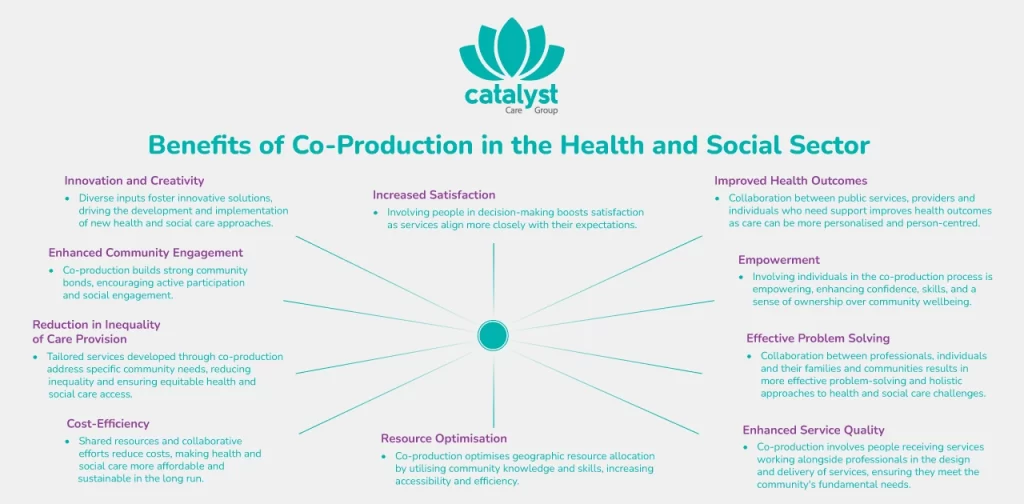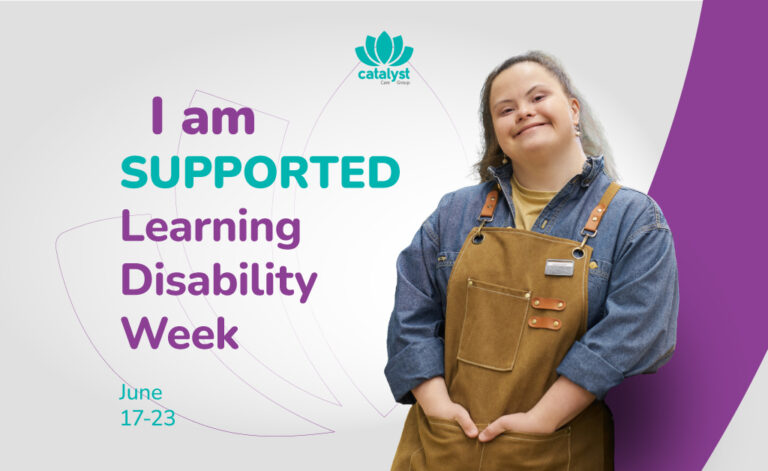Collaboration is the foundation of effective, compassionate services in health and social care. Co-production, a powerful concept often overlooked, emphasises the collaborative partnership between professionals, service users, and their communities. By actively involving everyone – from healthcare providers to individuals who need support and their families – in the decision-making process, co-production ensures services are tailored, empathetic, and genuinely impactful. It’s more than teamwork. It’s a shared journey toward better health and social well-being where everyone’s voice matters.
What is Co-Production in Health and Social Care
Co-production is a fundamental concept in the creation of public services and has the ability to significantly impact each of the main challenges facing the delivery of social care. Co-production in health and social care is a powerful approach that brings carers, healthcare professionals, individuals who need support, and their families together to design and deliver proactive health and care services. It means working together, sharing ideas and experiences, to create services that truly meet the needs of individuals. Co-production means that services are designed by experts and shaped by the people they are intended to support. In this co-production process, everyone’s voice matters, creating humanised solutions. This approach transforms health and social care from a one-size-fits-all model to a personalised, compassionate, and inclusive system.
Successful co-production in health and social care relies on open communication and mutual respect. It means healthcare providers and individuals coming together, breaking down barriers, and understanding each other’s perspectives. An effective co-production project has a few essential key features:
- Remove barriers between care recipients and providers
- Build on people’s capabilities
- Incorporate mutuality and reciprocity (where people work together to achieve shared objectives)
- Collaborate with professional and peer support networks
- Helping organisations go beyond simply providing services by assisting them in becoming advocates for change
Through this collaborative effort, services become more efficient, responsive, and, most importantly, genuinely helpful. Similarly, every participant in the co-production approach adds value, making health and care services not just functional but exceptional, ensuring that everyone receives the support they truly need.

Co-Production in Health Care
Co-production in healthcare is a collaborative approach where healthcare professionals and people who need care work together, becoming equal partners to design, deliver, and improve healthcare services. In simpler terms, co-production means that healthcare is not provided to people but created by people. Healthcare professionals and other staff members collaborate closely with the service users they support, valuing their opinions, listening to them, and building their confidence in the collaborative process of improving care. This co-production process is not just limited to medical treatments; it extends to how healthcare services are planned, managed, and evaluated. Co-production projects focus on harnessing people’s capabilities and strengths, encouraging them to actively participate in their healthcare journey. By adopting this person-centred perspective, co-production helps ensure that healthcare services are effective and tailored to meet individual needs and preferences.
Supporting co-production in healthcare means recognising that people with complex care needs and their families possess valuable insights about their own health. It creates an environment where these insights are respected and integrated into decision-making processes. When healthcare providers and individuals collaborate, they tap into diverse experiences and knowledge, leading to more holistic and person-centred healthcare solutions. Co-production helps bridge the gap between healthcare professionals and people needing person-centred care, fostering mutual trust and understanding. Ultimately, by developing co-production in healthcare, we empower individuals, enhance the quality of care, and build a healthcare system that truly serves the people it aims to help.
Co-Production in Social Care
Co-production in social care is a collaborative approach that involves working together to design and deliver support services. It means professionals and the people using services, along with their families and communities, team up to develop co-production projects. This approach ensures that the services accurately represent the needs and goals of people who require care. To support co-production, professionals tap into the wisdom of the community, engaging with people on a personal level to create services that genuinely make a positive difference in their lives.
Implementing co-production means building strong professional networks where ideas and experiences are shared openly, fostering an environment of trust and mutual respect. In essence, co-production empowers individuals, fosters inclusivity, and promotes personalised care, leading to social care services that are effective, deeply meaningful, and tailored to each person’s unique needs.
The Importance of Co-Production
Co-production is a powerful concept emphasising collaboration and teamwork between local authorities, service providers, and community members. It’s not just about providing services but about co-producing them together. The fundamental principles of co-production lie in fostering genuine partnerships and nurturing relationships between different organisations and the people they serve. Co-production ensures that diverse perspectives are valued by involving everyone in the process, from planning to implementation. This inclusive approach creates a level playing field, giving everyone the same opportunity to contribute their ideas and expertise. Through co-producing care and support services, communities can tailor solutions to their unique needs, leading to more effective and innovative approaches that make a difference.
The concept of co-production has been specifically stated in the statutory guidance of the Care Act of 2014. Co-production is defined in the guidance and is recommended to be a crucial component of the Care Act’s implementation. Co-production should be utilised, in particular, to prepare information and advice services, support evaluation, create preventative, strength-based services, and impact the care industry.
In co-production, relationship building is at the heart of success. A sense of trust and understanding is cultivated by actively engaging with community members, local authorities, and various organisations. Co-producing means breaking down traditional barriers and embracing the wealth of knowledge present within communities. This approach ensures that services meet the specific needs of the people they are designed for and empowers individuals to participate in decisions that affect their lives actively.
The Benefits of Co-Production
Co-production in health and social care offers many benefits that enhance the quality of services and promote a sense of community. Firstly, it fosters a spirit of collaboration between professionals and service users, ensuring that the care provided is tailored to individual needs and preferences. This personalised approach leads to better outcomes as it acknowledges each person’s unique circumstances.
Co-production strengthens the bond between caregivers and recipients, creating a supportive environment where everyone’s input is valued, leading to more effective and compassionate health and social care services.
Here are the benefits that co-production brings to the sector:

Principles of Co-Production
In health and social services, the key principles of co-production stand rooted in equality, diversity, accessibility, and reciprocity. These fundamental values pave the way for a collaborative approach, ensuring that everyone, regardless of their background or circumstances, receives fair, inclusive, and compassionate care.
Equality
In the context of co-production in the health and social sector, the principle of equality highlights the importance of fairness and justice. It signifies that every individual deserves equal access to quality care and support regardless of their background, socioeconomic status, or health condition. Equality demands the removal of systemic barriers that might hinder marginalised communities from receiving the same level of healthcare as others. It means tailoring services to individual needs, ensuring that healthcare is not a one-size-fits-all approach. By promoting equality, the health and social sectors foster an environment where everyone receives the attention and care they deserve. Embracing this principle creates a society where factors beyond one’s control do not predetermine health outcomes but are shaped by a commitment to ensuring fairness and equal opportunities for all.
Diversity
Co-production is not just about acknowledging differences in race, gender, or background but celebrating them. In healthcare and social services, this means valuing each individual’s unique perspectives and experiences. By fostering an environment where diverse voices are heard, healthcare providers can gain profound insights. For instance, understanding different cultural beliefs and practices allows for more effective care. By incorporating this principle into social services and healthcare, we create a system that truly serves all people.
Accessibility
This principle ensures that healthcare and social services are not just a privilege for a few but a right for all. Creating accessible spaces is essential, and it extends to the language used in healthcare communication. Ensuring information is available in various languages and formats enhances understanding and engagement. By breaking down barriers, be they physical, linguistic, or technological, healthcare and social services become inclusive ecosystems where nobody is left behind. Accessibility thus becomes the bridge connecting diverse communities to the support they need.
Reciprocity
Reciprocity, the principle of mutual exchange and benefit, transforms healthcare and social services into collaborative endeavours. It’s about recognising that everyone involved – healthcare providers, service users, and their families – brings valuable knowledge and expertise. In this model, service users aren’t passive recipients of care but are active partners, respected for their insights into their well-being. Likewise, healthcare professionals acknowledge and respect this knowledge, fostering a relationship built on trust and equality. Reciprocity also extends to community partnerships, where local knowledge and resources are harnessed for collective well-being. By embracing reciprocity, healthcare and social sectors evolve into symbiotic networks where everyone learns, supports, and benefits, creating a healthcare ecosystem that thrives on shared understanding, knowledge and mutual respect.
How Co-Production Works in Practice?
The co-production approach is a collaborative process that involves people who receive care, professionals, and the community working together. To make this happen in practice, the process follows:
- Sharing information and building relationships
- Building representative networks
- Gathering information to aid in objective decision-making
- Combining what works, local context, and lived experience
- Establishing common goals, purpose, values, and decision-making
- Thinking, planning, developing, and innovating continuously with one another
- Keeping the focus on governance, quality, outcomes, and evidence
- Identifying more areas for co-delivery
- Regularly evaluating, reflecting & reviewing progress & impact
Positive Outcomes with Co-Production
Co-production brings positive outcomes by involving people and professionals in decision-making. This approach ensures that the needs and perspectives of everyone are considered, leading to shared solutions that genuinely work. In order to co-design the services together, individuals and professionals build a balanced approach, aligning overarching aims with the practical realities faced by communities. This collaborative effort fosters a sense of ownership and understanding, resulting in tailored and shared solutions that are more effective and meaningful for everyone involved.










